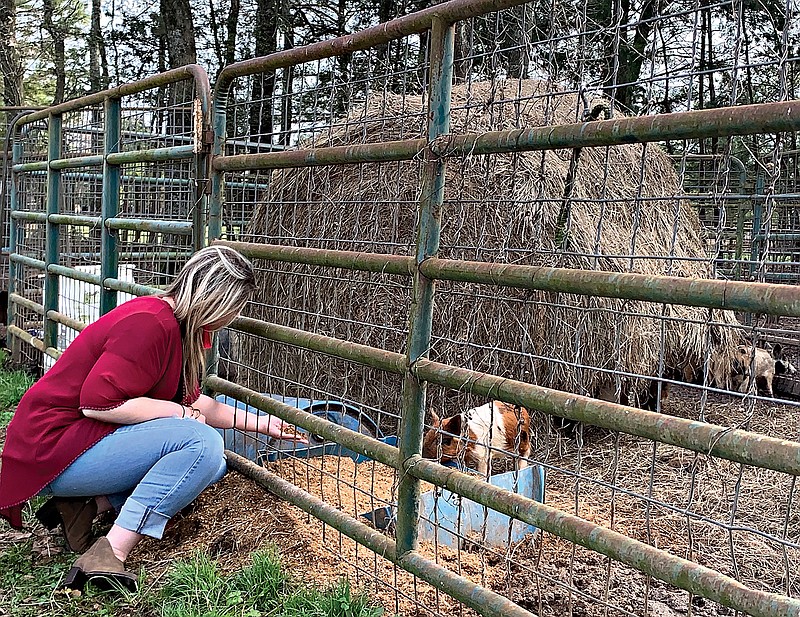EDITOR'S NOTE: This is the second in a three-part series about the prevalence and problems the presence of feral hogs bring. Several agencies and businesses are working to eradicate the animals. These stories, appearing Sunday, today and Tuesday, highlight some of those strategies.
SIMMS, Texas - Wade and Taylor Griffin are two young entrepreneurs who believe they have a better approach to the feral hog/human encroachment encounter at the licensed Circle G Farms and Wild Hog Buying facility.
They take the position that hog buyers like themselves can turn the difficult situation into a revenue producer.
"I've been around hogs since I was 13, going on 20 years now," Wade Griffin begins, "and we've been hog buyers since 2014. We're licensed to hold up to 200 pigs. Every part of the hog can be used, particularly heart valves for humans. Meat for the world here and abroad, scrap for dog food.
"Our goal is to educate why you need not kill, but do your best to trap and contain the pigs and then get them to a buyer like us or a processor and receive your money."
Wade's wife Taylor follows up.
"In reality, we are pretty much the answer to farmers and ranchers for this non-traditional extra income," she said.
Here's a real world example that occurred to the Griffins just two days before the interview.
"We had a guy who caught 11 (hogs) the other night in one of those modern Boar Buster traps. He brought them to us, and we weighed them. Some 1,440 pounds. We wrote him a check that same evening for $310," Taylor said.
"That was one trap, one night. Not bad," Wade said.
And then the two have a long-range goal. One that truly broadens their view.
"We are considering running a processing facility in Mount Pleasant for feral hogs only," Taylor said. "I've had some conversations with larger organizations, particularly two heart hospitals who will want the hearts and heart valves we get. This would be a seven-day-a-week, around-the-clock facility."
The market for hog meat is booming, the two explained. A plant can process between 250 to 400 hogs on a daily average, much like a domestic pork plant. Pigs wait in holding pens, enter a standardized assembly-line slaughter and are moved along the line of processing.
As regulated by FDA, hog parts not fit for human consumption such as hides, ears, feet and bones go to factories or are sent to dog food plants. Hearts are harvested for companies that use valves for human hearts, and feral hearts are especially appropriate for this use. Every part is vital. Nothing is wasted.
The closest processing plant is in San Antonio, Wade said.
"A facility like that wouldn't hurt us here in Simms, because we'd move up to holding 400 hogs and still be open seven days a week to receive a number of hogs. Someone might call at 10 o'clock at night saying they had a small number and could we take them. If they had a larger load, they could take them to Mount Pleasant, get weighed and paid at the same time."
Right now when called, one of the two may have to leave their other jobs to go get or receive pigs, Taylor said.
The entrepreneurs do have other jobs. Wade is a maintenance supervisor at Atlas Roofing Corp. in Daingerfield. Taylor is in the human resources department at Ameripak Foods in Hughes Springs. He's an alumnus of New Boston schools and she of Paul Pewitt schools.
The two currently have wild pig pens away from their farm home on property next to Wade's parent, Jim Griffin. Three different size pens are used to separate the pigs and keep them calm. One large section is a wetland area ,which is more comfortable and much like the pigs' natural habitat.
"Less stress, the better because they will die," Wade said. "You're taking a wild animal and putting it in a contained area, eating the food you give them. That's not usual.
"They will charge you, but a lot of times it's a bluff. I know what to look for."
The pigs are held until Wade can get them to a processing plant or the plant comes to pick them up.
There are difficulties. This is a new field. Transporting the hogs will always be problematical. Wade is thinking about putting together a truck-trailer combination for use at Circle G operation. Perhaps it will be with his own designs.
But there are difficulties with other methods of control, too, Wade said. Hunting, poisoning, use of dogs, etc., may not reduce numbers and will create a disposal problem. A proper poison may take years of testing. Even trapping, which works now, may be reduced in effectiveness.
" Some individuals will outsmart everything we do," Wade said. "That's when the dogs can help."
But slaughtering produces no income, no food and no usage of parts.
"There are other hog buyers like us out there. We're all educating the public that we should not kill and waste feral hogs."
Part of Wade's longtime work with hogs has included the more happy time when he supplied the pigs for the New Boston Rodeo Arena's hog-dog trial competitions.
"Those were fun times. It was great watching the dogs try to control the movement of the pigs for two minutes at a time."
Now the two entrepreneurs are trying to control the movement of the pigs for a lot longer time and for a much better reason.

